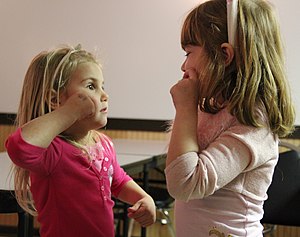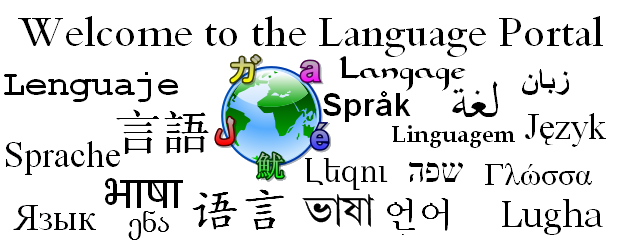Portal:Language




Language is a structured system of communication that consists of grammar and vocabulary. It is the primary means by which humans convey meaning, both in spoken and signed forms, and may also be conveyed through writing. Human language is characterized by its cultural and historical diversity, with significant variations observed between cultures and across time. Human languages possess the properties of productivity and displacement, which enable the creation of an infinite number of sentences, and the ability to refer to objects, events, and ideas that are not immediately present in the discourse. The use of human language relies on social convention and is acquired through learning.
Estimates of the number of human languages in the world vary between 5,000 and 7,000. Precise estimates depend on an arbitrary distinction (dichotomy) established between languages and dialects. Natural languages are spoken, signed, or both; however, any language can be encoded into secondary media using auditory, visual, or tactile stimuli – for example, writing, whistling, signing, or braille. In other words, human language is modality-independent, but written or signed language is the way to inscribe or encode the natural human speech or gestures.
Depending on philosophical perspectives regarding the definition of language and meaning, when used as a general concept, "language" may refer to the cognitive ability to learn and use systems of complex communication, or to describe the set of rules that makes up these systems, or the set of utterances that can be produced from those rules. All languages rely on the process of semiosis to relate signs to particular meanings. Oral, manual and tactile languages contain a phonological system that governs how symbols are used to form sequences known as words or morphemes, and a syntactic system that governs how words and morphemes are combined to form phrases and utterances.
The scientific study of language is called linguistics. Critical examinations of languages, such as philosophy of language, the relationships between language and thought, how words represent experience, etc., have been debated at least since Gorgias and Plato in ancient Greek civilization. Thinkers such as Jean-Jacques Rousseau (1712–1778) have argued that language originated from emotions, while others like Immanuel Kant (1724–1804) have argued that languages originated from rational and logical thought. Twentieth century philosophers such as Ludwig Wittgenstein (1889–1951) argued that philosophy is really the study of language itself. Major figures in contemporary linguistics of these times include Ferdinand de Saussure and Noam Chomsky. (Full article...)
Mongolian is the principal language of the Mongolic language family that originated in the Mongolian Plateau. It is spoken by ethnic Mongols and other closely related Mongolic peoples who are native to modern Mongolia and surrounding parts of East and North Asia. Mongolian is the official language of Mongolia and Inner Mongolia and a recognized language of Xinjiang and Qinghai.
The number of speakers across all its dialects may be 5–6 million, including the vast majority of the residents of Mongolia and many of the ethnic Mongol residents of the Inner Mongolia of China. In Mongolia, Khalkha Mongolian is predominant, and is currently written in both Cyrillic and the traditional Mongolian script. In Inner Mongolia, it is dialectally more diverse and written in the traditional Mongolian script. However, Mongols in both countries often use the Latin script for convenience on the Internet. (Full article...)

- ... that Saulteaux linguist Margaret Cote was the first person in Saskatchewan to teach a First Nations language in a public school?
- ... that a Hawaii TV station's switch from Japanese-language programming to home shopping stirred viewer outcry?
- ... that the parliamentary sign-language interpreter could not make out what South African MP Joan Fubbs tried to say in her tribute to President Cyril Ramaphosa?
- ... that Navidades by Luis Miguel was the first Spanish-language album to enter the Billboard Top Holiday Albums since 1966?
- ... that the seven leaders of the East Turkestan Revolutionary Party had Uyghur-language code names, the initials of which spelled out the word Lëninchi, meaning "Leninist"?
- ... that Dorothy Stanley was once said to be one of the last speakers of the Miwok languages?
- ...that linguist Asim Peco is an expert in the language of eastern Herzegovina?
- ...that three different languages that used to be spoken in Nicaragua are now extinct?
- ...that Russian is spoken in Israel by about 20% of the total population?
- ...that the name of the koala derives from the word gula in Dharuk and other Yuin–Kuric languages?
Linguistics: Computational linguistics • Grammar • Historical linguistics • Morphology • Phonetics • Phonology • Pragmatics • Reading • Semantics • Sociolinguistics • Syntax • Writing
Languages: Language families • Pidgins and creoles • Sign languages
Linguists: By nationality • Historical linguists • Morphologists • Phoneticians • Phonologists • Sociolinguists • Syntacticians • Translators
Stubs: Constructed languages • Languages • Linguists • Pidgins and creoles • Typography • Vocabulary and usage • Writing systems
Full Language category tree
|
|---|
|
Select [►] to view subcategories
|
This article discusses the phonological system of standard Russian based on the Moscow dialect (unless otherwise noted). For an overview of dialects in the Russian language, see Russian dialects. Most descriptions of Russian describe it as having five vowel phonemes, though there is some dispute over whether a sixth vowel, /ɨ/, is separate from /i/. Russian has 34 consonants, which can be divided into two types:
- hard (твёрдый [ˈtvʲordɨj]) or plain
- soft (мягкий [ˈmʲæxʲkʲɪj]) or palatalized
Russian also distinguishes hard consonants from soft consonants and from iotated consonants, making four sets in total: /C Cʲ Cj Cʲj/, although /Cj/ in native words appears only at morpheme boundaries (подъезд, podyezd, IPA: [pɐdˈjest] for example). Russian also preserves palatalized consonants that are followed by another consonant more often than other Slavic languages do. Like Polish, it has both hard postalveolars (/ʂ ʐ/) and soft ones (/tɕ ɕː/ and marginally or dialectically /ʑː/). (Full article...)

Countries and regions where Portuguese has official status
- 22 November 2024 – Censorship in Belarus
- In a speech at Minsk State Linguistic University, Belarusian President Alexander Lukashenko threatens to shut down the Internet in his country if there are mass protests before the upcoming presidential election after the previous election saw mass protests. (Rferl)
- 20 August 2024 – Germany–Iran relations
- Following the ordered closure of the Islamic Centre Hamburg in Hamburg, Germany, Iran orders the closure of two branches of a German language school in Tehran for "breaching Iranian law, committing various illegal actions and extensive financial violations." In response, Germany summons the Iranian ambassador. (DW)
- 19 July 2024 –
- Ukrainian linguist, nationalist politician, and former People's Deputy Iryna Farion is shot and killed in Lviv, Ukraine by an unknown assailant. (Reuters)
- 27 June 2024 –
- Ukrainian president Volodymyr Zelenskyy signs a law establishing English as an official language of international communication in Ukraine. (The Kyiv Independent)

Languages of Africa: Arabic, Chadic, Cushitic, Kanuri, Maasai, Setswana, Swahili, Turkana, Xhosa, Yoruba, Zulu, more...
Languages of the Americas: Aleut, Carib, Cherokee, Inuktitut, Iroquois, Kootenai, Mayan, Nahuatl, Navajo, Quechuan, Salish, American Sign Language, more...
Languages of Asia: Arabic, Assamese, Balochi, Bengali, Chinese, Japanese, Hajong, Hebrew, Hindustani, Kannada, Kokborok, Marathi, Khasi, Korean, Kurdish, Malayalam, Manipuri, Meithei, Mongolian, Persian, Rajasthani, Sindhi, Sanskrit, Sylheti, Tamil, Tanchangya, Tulu, Telugu, Tibetan, Thai, Turkish, Vietnamese, Khowar, more...
Languages of Austronesia: Austric, Fijian, Hawaiian, Javanese, Malagasy, Malay, Maori, Marshallese, Samoan, Tahitian, Tagalog, Tongan, Auslan, more...
Languages of Europe: Basque, Czech, Danish, Dutch, English (book), French, German, Greek, Italian, Latin, Leonese, Norwegian, Polish, Portuguese, Romanian, Russian, Slovak, Spanish, Ukrainian more...
Constructed languages: Esperanto, Ido, Volapük, more...
Agglutinative language, Analytic language, Constructed language, Creole, Context-free language, Extinct language, Dialect, Fusional language, Inflectional language, International language, Isolating language, Language isolate, National language, Natural language, Pidgin, Pluricentric language, Polysynthetic language, Proto-language, Sign language, Spoken language, Synthetic language, Variety (linguistics)

Applied linguistics, Cognitive linguistics, Accent (dialect), Computational linguistics, Descriptive linguistics, Eurolinguistics, Generative linguistics, Historical linguistics, Lexicology, Lexical semantics, Morphology, Onomasiology, Phonetics, Phonology, Pragmatics, Prescription, Prototype semantics, Psycholinguistics, Semantics, Stylistics, Sociolinguistics, Syntax
See also: List of linguists

Alphabets: Arabic alphabet, Bengali alphabet, Cyrillic alphabet, Hebrew alphabet, Latin alphabet, more...
Other writing systems: Abjad, Abugida, Braille, Hieroglyphics, Logogram, Syllabary, SignWriting, more..
See also: History of the alphabet, Script
The following Wikimedia Foundation sister projects provide more on this subject:
-
Commons
Free media repository -
Wikibooks
Free textbooks and manuals -
Wikidata
Free knowledge base -
Wikinews
Free-content news -
Wikiquote
Collection of quotations -
Wikisource
Free-content library -
Wikiversity
Free learning tools -
Wiktionary
Dictionary and thesaurus
| Enter an ISO 639 code to find the corresponding language article |





















